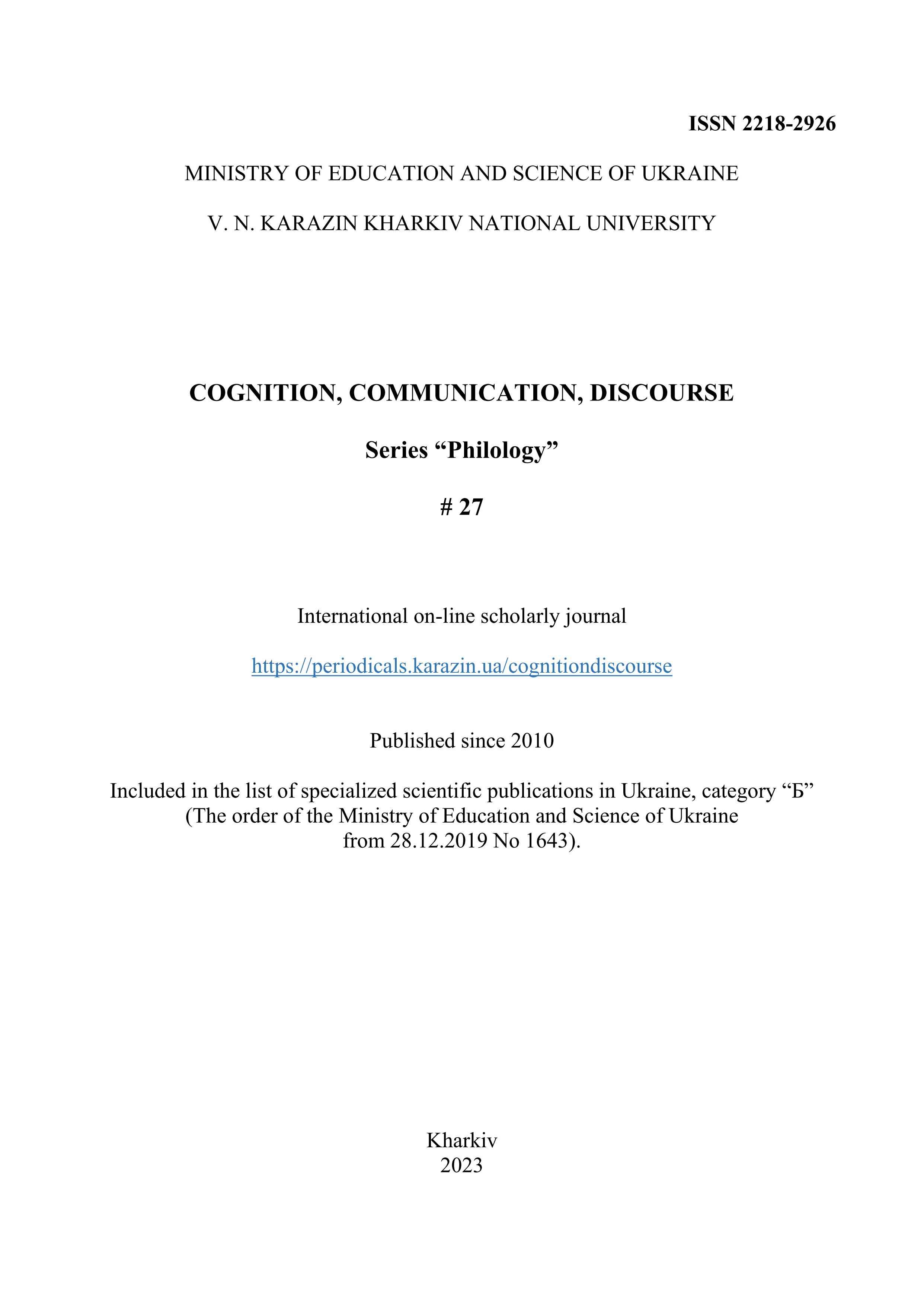Ecolinguistic approach to the analysis of the notion “leader’s charisma” (based on English non-fiction literature)
Abstract
The research attempts to study various aspects and correlations between the verbal and non-verbal characteristics of charismatic leaders from an ecolinguistic perspective. The analysis of the lingual and non-lingual repertoire of a charismatic leader, his main characteristics and correspondence of his verbal, non-verbal and supra-verbal behavior to the ecological principles of communication demonstrates that if the leader avoids using in their speech the elements producing a harmful effect on physical, psychological or emotional state of a partner they can reach ecologically effective influence on the audience. A charismatic leader's identity emerges from psychological and social factors that manifest in their speech. This statement correlates with the principles of ecolinguistics, which involve the analysis of verbal, non-verbal, and supra-verbal phenomena in the unity with natural, social, and psychological factors. Modern English non-fiction literature was chosen as the research material. The non-fiction authors – scientists, psychologists, coaches, and business-trainers, focus the reader’s attention on the main criteria for creating the image of a charismatic leader, which includes verbal and non-verbal communicative components, as well as their ecological combinability. Core features that effectively shape the image of a successful leader are charisma and high communicative skills, which include preservation of communicative maxims of quantity, quality, relation, and manner. The focus of ecolinguistic research on a charismatic leader who influences the society and achieves their goals through various means, including language, contributes to further development of the theory of discursive personality. The results of this study can be used in discourse studies, studies of verbal and non-verbal communication, pragmalinguistics, and communication theory.
Downloads
References
Gardner, G. (2009). Leadership skills. Retrieved July 26, 2022, from https://www.free-ebooks.net/search/leadership+skills
Gaspar, L. (2021). Leadership? Just a state of mind. Retrieved from https://www.free-ebooks.net/business/Leadership-Just-a-state-of-mind
Grice, P. (1975). Logic and Conversation. In P. Cole, & J. J. Morgan (Eds.), Syntax and Semantics 3: Speech Acts (pp. 41–58). New York, NY: Academic Press.
Nakka, S. Bh. R. (2019). How to be the Earth Leader for Ecosystem Resilience and Sustainable Development. Retrieved from https://www.free-ebooks.net/environmental-studies-academic/how-to-be-the-earth-leader-for-ecosystem-resilience-and-sustainable-development
Oden, Th. C. (1982). The Intensive Group Experience: The New Pietism. In E. Barker (Ed.), New Religions Movements: A Perspective for Understanding Society (pp. 86–106). New York: Edwin Mellen Press.
Petlyuchenko, N. (2019). Ideal types in linguistics: New approaches to the study of the charisma concept in political discourse. Odessa Linguistic Journal, 14, 75–88.
Profiles in leadership: Directors of the Central Intelligence Agency and its predecessors 1941 - 2023. Central Intelligence Agency. Retrieved from https://www.cia.gov/static/4789eee9e734cd7409eed3d133929b36/Profiles-in-Leadership-Updated-July-2023.pdf
Shepel, Yu. (2022). Ekolingvistychnyi pidhid do analizu eptonimiv yak fenomen dyskursu [Ecolinguistic approach to the analysis of eptonyms as discourse phenomenon]. Proceedings of the 7th International scientific and practical conference, 681–682. Retrieved from https://sci-conf.com.ua/vii-mezhdunarodnaya-nauchno-prakticheskaya-konferentsiya-international-scientific-innovations-in-human-life-19-21-yanvarya-2022-goda-manchester-velikobritaniya-arhiv/
Shevchenko, I. S. (2015). The correlation of the informational and phatic functions a problem of ecolinguistics. Cognition, Communication, Discourse, 10, 114–32. doi:10.26565/2218-2926-2015-10-08
Skrynnik, Yu., & Soloshchuk, L. (2022). Social roles as a construct of ecological interaction: Diachronic aspects. Theory and Practice in Language Studies, 12(8), 1483–1488. doi:10.17507/tpls.1208.03
Skrynnik, Yu. S. (2021). Supra-verbal components as discourse-forming medium for social roles. In Science and Education. A New Dimension. Philology, 9(74), 71–76. doi:10.31174/send-ph2021-251ix74-17
Soloshchuk, l. V. (2022). Dyskursyvna osobystist’ “detektyv-amator” (na materiali tvoriv A. Kristi) [The discursive personality “amateur detective” (on the basis of the novels of A. Christie)]. Aktual’ni pytannya gumanitarnyh nauk, 48(2), 118–124. doi:10.24919/2308-4863/48-2-19
Stibbe, A. (2023). Taste the feeling: an ecolinguistic analysis of Coca-Cola advertising. Journal of World Languages. doi:10.1515/jwl-2023-0027
Tytarenko, V. V. (2002). Teoretychni problemy doslidzhennya harysmy ta harysmatysmu [Theoretical problems of the research of charisma and charismatism]. Ukrayins’ke religiyeznavstvo, 24, 39–48.
Zhang, R., & Wei, H. (2020). Human-nature relationships in experiential meaning: Transitivity system of Chinese from an ecolinguistic perspective. Journal of World Languages, 6(3), 217–235. Retrieved from https://www.degruyter.com/document/https:doi/10.1080/21698252.2020.1819519/html
Copyright (c) 2023 Soloshchuk Lyudmyla, Skrynnik Yuliia

This work is licensed under a Creative Commons Attribution-NonCommercial-NoDerivatives 4.0 International License.
Authors, who publish with this journal, accept the following conditions:
The authors reserve the copyright of their work and transfer to the journal the right of the first publication of this work under the terms of the Creative Commons Attribution License (CC BY), which allows other persons to freely distribute a published work with mandatory reference to the authors of the original work and the first publication of the work in this journal.
Authors have the right to enter into separate additional agreements for the non-exclusive dissemination of the work in the form in which it was published by this journal (for example, to post the work in the electronic institutions' repository or to publish as part of a monograph), provided that the link to the first publication of the work in this journal is given.
The journal policy allows and encourages the authors to place the manuscripts on the Internet (for example, in the institutions' repositories or on personal websites), both before the presentation of this manuscript to the editorial board and during review procedure, as it contributes to the creation of productive scientific discussion and positively affects the efficiency and dynamics of citing the published work (see The Effect of Open Access).




